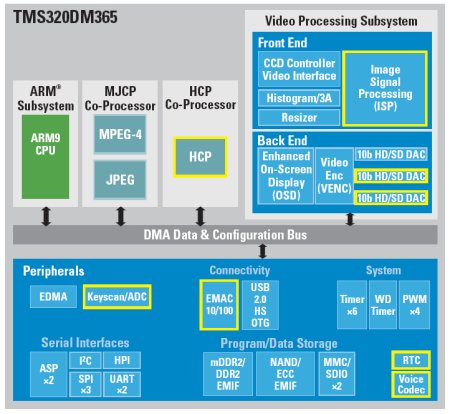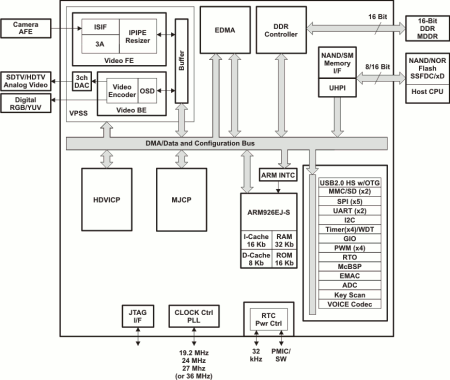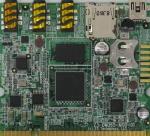DaVinci chip boasts 1080p video
Mar 5, 2009 — by Eric Brown — from the LinuxDevices Archive — 96 views Texas Instruments (TI) is sampling its latest DaVinci SoC, said to support 1080p video even with the demanding H264 codec. The TMS320DM365 has a new ISP (image signal processor), a 300MHz ARM926EJ-S core, plus multiple on-board peripherals, and is available with a Linux-ready evaluation kit (pictured).
Texas Instruments (TI) is sampling its latest DaVinci SoC, said to support 1080p video even with the demanding H264 codec. The TMS320DM365 has a new ISP (image signal processor), a 300MHz ARM926EJ-S core, plus multiple on-board peripherals, and is available with a Linux-ready evaluation kit (pictured).
The DaVinci architecture TMS320DM365 SoC (system-on-chip) is a higher end version of TI's sub-$10, 720p-capable TMS320DM355 which began sampling in September 2007, yet it targets many of the same applications. The SoC is aimed at media playback and camera-driven applications, including video doorbells, baby monitors, digital signage, and portable media players, says the company. The DM365 is claimed to save developers up to 25 percent on system costs compared, presumably, to piecing together CPU, image processors and accelerators, and codecs separately.
In addition to TI's MontaVista Linux-equipped Digital Video Evaluation Module (DVEVM), several vendors have already announced hardware support for the new chip, along with open-source Linux installs. These include a camera kit from Leopard Imaging, and a Linux-based processor module from Z3 Technology aimed at surveillance and industrial video applications (see farther below).
Video accelerators and an intelligent ISP
The TMS320DM365 is built around the tried and true ARM926EJ-S core, and is available in 270MHz and 300MHz versions. The core is said to offload video encode/decode functions to two integrated HD video accelerators, the HDVICP and MJCP engines. These accelerators work with the SoC's “production-qualified”, royalty free H.264, MPEG-4, MPEG-2, MJPEG, and VC1 codecs, says TI. The DM365 is touted for its ability to provide 1080p H.264 at 10fps, 1080p MPEG-4 at 24fps, and 30fps delivery of both 720p H.264 and MPEG-4.

Streamlined DM365 block diagram, with additions compared to the DM355 shown in yellow
(Click to enlarge)
Compared to the DM355, the DM365 adds an integrated ISP to the video processing subsystem. The ISP is said to provide video stabilization, noise filtering, defect pixel correction, auto white balance, auto focus, auto exposure, and edge enhancement. With these built-in capabilities, developers do not need to create custom algorithms in-house, or purchase expensive optics with additional intelligence, says TI.
The ISP even offers face detection, which would enable intelligent digital signage that could detect viewers and display relevant advertising accordingly, or a video doorbell that recognizes family members and automatically unlocks the door, says the company.

Detailed DM365 block diagram
(Click to enlarge)
Specifications listed for the DM365 are said to include:
- CPU — ARM926EJ-S clocked to 270MHz or 300MHz
- Video co-processors — HDVICP and MJCP engines, supporting H.264, MPEG4, MPEG2, MJPEG, JPEG, WMV9/VC1
- Video processing subsystem with ISP (front end):
- Hardware IPIPE for real-time image processing
- Resize engine (from 1/16× to 8×)
- IPIPE interface (IPIPEIF)
- Image sensor interface (ISIF) and CMOS imager interface
- 16-bit parallel AFE (Analog Front End) interface, up to 120MHz
- Glueless interface to common video decoders
- BT.601/BT.656/BT.1120 digital YCbCr 4:2:2 (8-/16-bit module
- Histogram module
- Lens distortion correction module (LDC)
- Hardware 3A statistics collection module (H3A)
- Video processing subsystem with ISP (back end):
- Hardware on-screen display (OSD)
- Composite NTSC/PAL video encoder output
- 8-/16-bit YCC and up to 24-bit RGB888 digital output
- DACs for HD analog video output
- LCD controller
- BT.601/BT.656 digital YCbCr 4:2:2 (8-/16-bit) interface
- External memory interfaces (EMIFs) — DDR2 and mDDR SDRAM 16-bit EMIF with 256MB address space; asynchronous16-/8-bit EMIF (AEMIF) with flash memory interfaces
- Flash card interfaces — 2 x MMC/ SD/SDIO
- Networking — 10/100Mbps Ethernet Media Access Controller (EMAC)
- USB — 1 x USB 2.0 port with high-speed PHY, supporting host, device, and OTG
- SPI — 5 x serial port interfaces (SPI), each with two chip-selects
- Serial — 1 x multi-channel buffered serial port (McBSP) with I2S, AC97, S/PDIF, AIC12, SPI, T1/E1 framers, TDM, and 128-channel mode interfaces
- UARTS — 2 x UARTs
- I2C — 1 x master/slave I2C bus
- PWM/RTO outputs — 4 x pulse width modulator (PWM) outputs; 4 x RTO (real time out) outputs
- GPIO — up to 104 General-Purpose I/O
- HPI — 16-bit host-port interface
- Timers - 4 x 64-bit general-purpose timers; 1 x 64-bit watchdog timer
- Enhanced Direct-Memory-Access (EDMA) controller
- Other features — ADC; power management and real-time clock subsystem (PRTCSS); key scan; voice codec
- Boot modes — on-chip ARM ROM bootloader; AEMIF (NOR and OneNAND)
- Clock — crystal or external clock input (typically 19.2Mhz, 24MHz, 27Mhz, or 36MHz); PLL clock generators
- Debug interface support — JTAG; ETB; Device Revision ID readable by ARM
- Packaging — 338-pin BGA (ZCE suffix), 0.65-mm ball pitch; 65nm process
- Power — 3.3-V and 1.8-V I/O, 1.2-V/ 1.35-V internal; configurable power-saving modes
TMX320DM365 Digital Video Evaluation Module (DVEVM)
TI is offering a TMX320DM365 Digital Video Evaluation Module (DVEVM) for developing production-ready application code for the ARM core, as well as providing access to the HMJCP coprocessor core using DaVinci APIs. As part of the DVEVM, TI supplies a Linux Support Package Software Development Kit (LSP SDK) and a TI eXpressDSP Linux-based DVSDK, which is available for web download. The Digital Video Software Production Bundle (DVSPB) board support package based on MontaVista Linux is recommended for production.
 TMX320DM365 DVEVM |
The DM365 DVEVM kit is said to offer the following components:
- TMX320DM365-based development board
- IR remote
- 2GB NAND flash
- Video capture of NTSC or PAL signals via component for HD and composite/S-Video for SD
- NTSC or PAL output via component for HD and composite/S-Video for SD
- Audio (microphone in, headphone out, line in and line out)
- UART
- USB 2.0 HS
- JTAG for test
- MontaVista Pro demonstration tools
- Getting Started Guide and Hardware Technical Reference
The LSP SDK is said to include:
- TI's HD MPEG-4, H.264, JPEG, and G.711 production codecs
- Custom codecs that comply with TI's eXpressDSP Digital Media (xDM) algorithm standard
- Multimedia APIs and codec engine frameworks
- Demonstration version of MontaVista Linux Pro 5.0
- Drivers for UART, I2C, SPI, EDMA, EMAC, NAND,MMC, SD card, USB host/gadget, RTC, HPI, voice codec
- Video processing subsystem (Display, Capture, CCD Controller, Resizer, Previewer)
- OSS Audio (ASP), GPIO, PWM, WDTIM
- U-boot loader
Third-party DM365 products
 Z3's DM365-based M365-MOD module |
Leopard Imaging and Z3 Technology are now offering development designs based on the TI TMS320DM365. In the second half of 2009, meanwhile, a Windows Embedded CE development kit will be available from MPC Data, and a real-time operating system (RTOS) kit will be available from eSOL, says TI. Here are some more details on the two shipping products:
- Z3 Technology M365-MOD — Z3 Technology is offering immediate availability of a 2.4 x 2.6-inch (60 x 67mm) module that supports the H.264 codec with up to 720p HD at 30fps encode or decode. The M365-MOD module is designed for applications including low-bandwidth video security, embedded solid-state DVR, industrial video, and video streaming applications, says Z3. The module ships with open-source Linux code, as well as a multimedia framework based upon the open-source Gstreamer. The M365-MOD also contains options for additional audio codecs, image codecs, and application software, says the company.
- Leopard Imaging LI-5M02 — Leopard Imaging announced the availability of an HD camera kit based on a Micron/Aptina 5 Mega-pixel CMOS sensor designed for 720p HD cameras. The LI-5M02 reference design targets vision, game (hunting) camera, and Vo2IP applications, says the company. The LI-5M02 plugs into TI's DM365 DVEVM board (see above), and provides an HD camera board, a free Linux driver, application source code, and binary files, says Leopard. It is also said to ship with a royalty-free 2A function library (auto-exposure and auto-white balance) for image tuning.
Availability
The TMX320DM365 processor is available for sampling, priced at USD $37.85 (100 units). Also available for order entry is the $600 TMX320DM365 Digital Video Evaluation Module (DVEVM). More information on the DM365 may be found here.
This article was originally published on LinuxDevices.com and has been donated to the open source community by QuinStreet Inc. Please visit LinuxToday.com for up-to-date news and articles about Linux and open source.